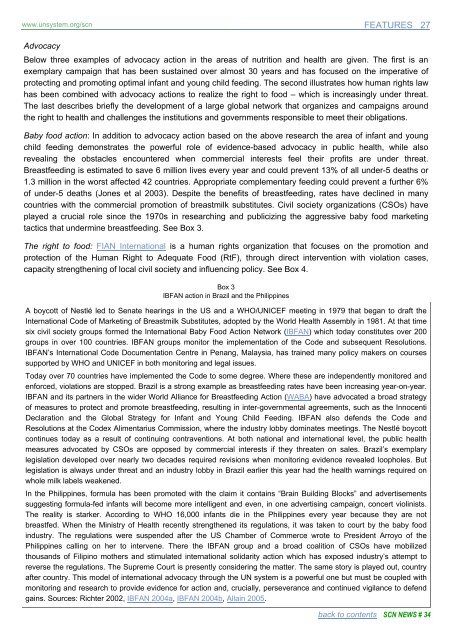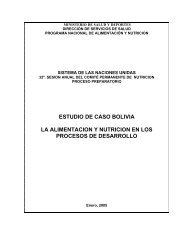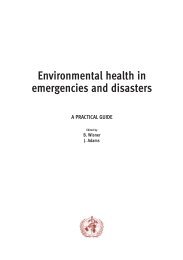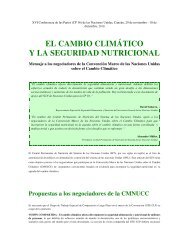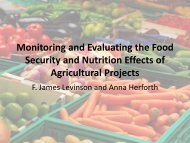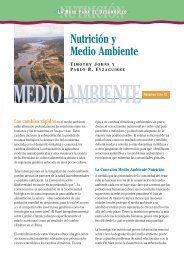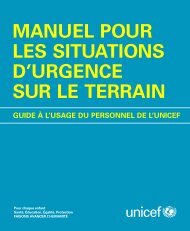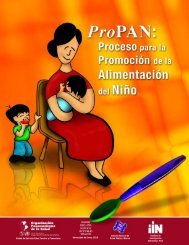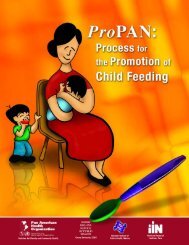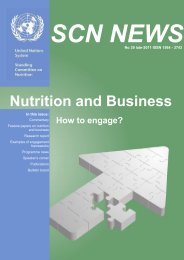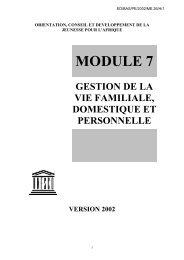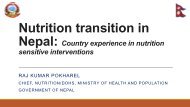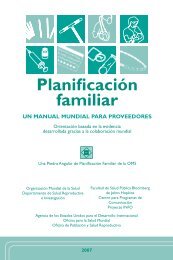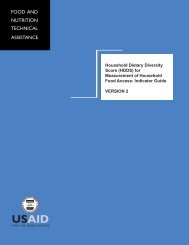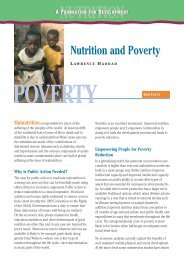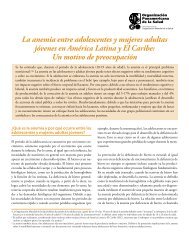SCN News No 34 - UNSCN
SCN News No 34 - UNSCN
SCN News No 34 - UNSCN
You also want an ePaper? Increase the reach of your titles
YUMPU automatically turns print PDFs into web optimized ePapers that Google loves.
www.unsystem.org/scn FEATURES 27<br />
Advocacy<br />
Below three examples of advocacy action in the areas of nutrition and health are given. The first is an<br />
exemplary campaign that has been sustained over almost 30 years and has focused on the imperative of<br />
protecting and promoting optimal infant and young child feeding. The second illustrates how human rights law<br />
has been combined with advocacy actions to realize the right to food – which is increasingly under threat.<br />
The last describes briefly the development of a large global network that organizes and campaigns around<br />
the right to health and challenges the institutions and governments responsible to meet their obligations.<br />
Baby food action: In addition to advocacy action based on the above research the area of infant and young<br />
child feeding demonstrates the powerful role of evidence-based advocacy in public health, while also<br />
revealing the obstacles encountered when commercial interests feel their profits are under threat.<br />
Breastfeeding is estimated to save 6 million lives every year and could prevent 13% of all under-5 deaths or<br />
1.3 million in the worst affected 42 countries. Appropriate complementary feeding could prevent a further 6%<br />
of under-5 deaths (Jones et al 2003). Despite the benefits of breastfeeding, rates have declined in many<br />
countries with the commercial promotion of breastmilk substitutes. Civil society organizations (CSOs) have<br />
played a crucial role since the 1970s in researching and publicizing the aggressive baby food marketing<br />
tactics that undermine breastfeeding. See Box 3.<br />
The right to food: FIAN International is a human rights organization that focuses on the promotion and<br />
protection of the Human Right to Adequate Food (RtF), through direct intervention with violation cases,<br />
capacity strengthening of local civil society and influencing policy. See Box 4.<br />
Box 3<br />
IBFAN action in Brazil and the Philippines<br />
A boycott of Nestlé led to Senate hearings in the US and a WHO/UNICEF meeting in 1979 that began to draft the<br />
International Code of Marketing of Breastmilk Substitutes, adopted by the World Health Assembly in 1981. At that time<br />
six civil society groups formed the International Baby Food Action Network (IBFAN) which today constitutes over 200<br />
groups in over 100 countries. IBFAN groups monitor the implementation of the Code and subsequent Resolutions.<br />
IBFAN’s International Code Documentation Centre in Penang, Malaysia, has trained many policy makers on courses<br />
supported by WHO and UNICEF in both monitoring and legal issues.<br />
Today over 70 countries have implemented the Code to some degree. Where these are independently monitored and<br />
enforced, violations are stopped. Brazil is a strong example as breastfeeding rates have been increasing year-on-year.<br />
IBFAN and its partners in the wider World Alliance for Breastfeeding Action (WABA) have advocated a broad strategy<br />
of measures to protect and promote breastfeeding, resulting in inter-governmental agreements, such as the Innocenti<br />
Declaration and the Global Strategy for Infant and Young Child Feeding. IBFAN also defends the Code and<br />
Resolutions at the Codex Alimentarius Commission, where the industry lobby dominates meetings. The Nestlé boycott<br />
continues today as a result of continuing contraventions. At both national and international level, the public health<br />
measures advocated by CSOs are opposed by commercial interests if they threaten on sales. Brazil’s exemplary<br />
legislation developed over nearly two decades required revisions when monitoring evidence revealed loopholes. But<br />
legislation is always under threat and an industry lobby in Brazil earlier this year had the health warnings required on<br />
whole milk labels weakened.<br />
In the Philippines, formula has been promoted with the claim it contains “Brain Building Blocks” and advertisements<br />
suggesting formula-fed infants will become more intelligent and even, in one advertising campaign, concert violinists.<br />
The reality is starker. According to WHO 16,000 infants die in the Philippines every year because they are not<br />
breastfed. When the Ministry of Health recently strengthened its regulations, it was taken to court by the baby food<br />
industry. The regulations were suspended after the US Chamber of Commerce wrote to President Arroyo of the<br />
Philippines calling on her to intervene. There the IBFAN group and a broad coalition of CSOs have mobilized<br />
thousands of Filipino mothers and stimulated international solidarity action which has exposed industry’s attempt to<br />
reverse the regulations. The Supreme Court is presently considering the matter. The same story is played out, country<br />
after country. This model of international advocacy through the UN system is a powerful one but must be coupled with<br />
monitoring and research to provide evidence for action and, crucially, perseverance and continued vigilance to defend<br />
gains. Sources: Richter 2002, IBFAN 2004a, IBFAN 2004b, Allain 2005.<br />
back to contents <strong>SCN</strong> NEWS # <strong>34</strong>


